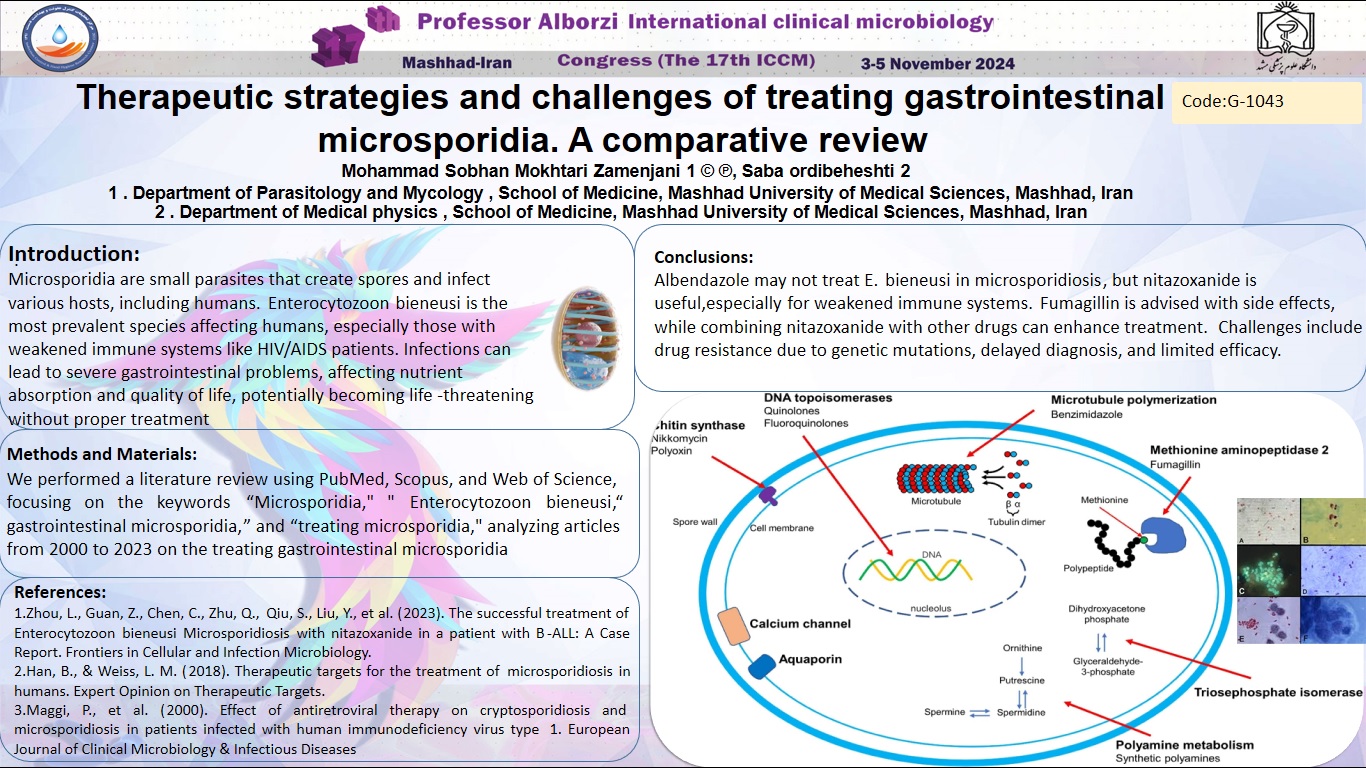استراتژی های درمانی و چالش های درمان میکروسپوریدیا گوارشی. یک مرور مقایسه ای
کد: G-1043
نویسندگان: Mohammad Sobhan Mokhtari Zamenjani © ℗, Saba Ordibeheshti
زمان بندی: زمان بندی نشده!
دانلود: دانلود پوستر
خلاصه مقاله:
خلاصه مقاله
Introduction Microsporidia is a diverse group of tiny, single-celled parasites that can produce spores and infect a wide range of hosts, including humans. The most common species that affects humans is Enterocytozoon bieneusi. This parasite poses a significant threat to individuals with weakened immune systems, such as those living with HIV/AIDS, organ transplant recipients, and people undergoing chemotherapy. If someone becomes infected, they may experience severe gastrointestinal issues, such as persistent diarrhea and difficulty in absorbing nutrients. These problems can significantly impact their quality of life and may even become life-threatening if not treated properly.Current Treatment Options Albendazole: This medication is commonly used to treat microsporidiosis by disrupting the structure of the parasite. However, it may not be effective against E. bieneusi, and some individuals may not experience significant improvement with this treatment. Nitazoxanide: This antiparasitic drug has shown promising results for treating microsporidiosis, especially in individuals with weakened immune systems. It works by blocking an essential enzyme that the protozoa need for energy. Research has suggested that it can be effective when albendazole fails. Fumagillin: This drug is particularly recommended for treating E. bieneusi infections, especially in patients with AIDS. It tends to be more effective against microsporidia than albendazole. However, its use is somewhat limited due to potential side effects such as bone marrow toxicity, and it may not be widely available. Combination Therapies: Recent studies indicate that using nitazoxanide in combination with other antiparasitic or immune-boosting medications could improve the results for patients who do not respond well to standard single-drug treatments. Challenges in Treatment • Limited Efficacy: Many treatments, particularly albendazole, are often ineffective, leading to treatment failures. • Side Effects: Adverse effects associated with some drugs, such as fumagillin, limit their use in vulnerable populations. • Delayed Diagnosis: Microsporidia infections are frequently misdiagnosed or diagnosed late due to the limitations of traditional diagnostic methods. Conclusion Dealing with microsporidia poses challenges for people, with weakened systems and finding effective treatments is crucial due to the parasites resistance to current drugs, like albendazole and nitazoxanide. Research efforts must persist in order to develop treatment methods and improve.
کلمات کلیدی
Microsporidiosis,Enterocytozoon bieneusi, treatment,Albendazole,Nitazoxanide,Fumagillin
